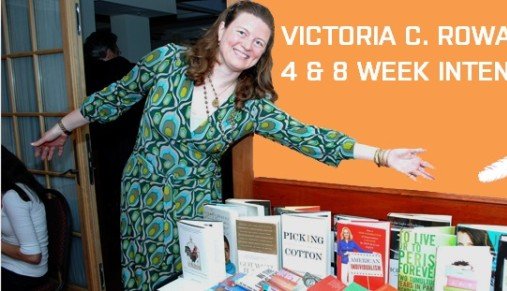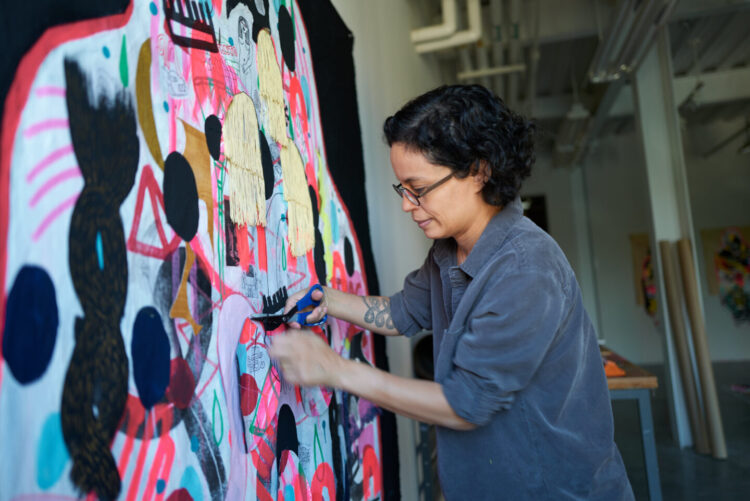Non-Writing Tips for Getting Published
Have you been grinding away at your novel for years? Maybe you’ve got a great book in you but don’t know where to take it? Or perhaps publishing a book is the next step to establishing your expertise in your field. Creative Capital is launching a brand new workshop this month for artists seeking publishing strategies. Victoria Rowan’s workshops, Storyselling: The Secrets of Successful Book Proposals, offered regularly, are an intensive “how-to” on getting your words out there. The experienced editor, author, and workshop leader Victoria offers the tips below for aspiring authors.

Victoria Rowan at the Ideasmyth Event “Monogamy Memoirists Meet their Match,” displaying all the finished products of our the Ideasmyth Family
Here’s the good news: Over my 30+ years of working as an editor or writing coach to all types of creative professionals, I have personally witnessed that anyone who really wants to be a published writer will succeed.
The reason why so many people fail is that they aren’t aware of some of these essential non-writing tips:
- Develop Healthy Arrogance
By that I mean you must have an unshakable belief that you have something (a message, a cause, a sensibility, a voice) worth sharing with others. Especially if you have never published before. If you don’t believe in yourself, who will?! Until you have the entourage that can come with success (the agent, editor, manager, publicist, etc.), you are your own best—and only!—advocate. - Develop Healthy Humility
Accept that working hard on your writing doesn’t automatically make you entitled to any kind of fame or fortune. Your personal best is a fantastic personal achievement, but it may not be professionally competitive—yet. Read around the journalism and great works of your field. Develop an expertise. Assess where you have the best potential to shine and strategize on how to make your place in the sun. - Know Your People
Do you know who you’re talking to? Just because you want to create doesn’t mean that everyone will want what you have. Who is your ideal audience? Is your substance being delivered in a signature standout style that will snag their attention - Know Your Heroes
Whose careers make you the most envious? Who have taken the routes you think you could take on? Those are the people making the moves you want to study. If these trailblazers are still alive, reach out to them with some genuine appreciation and perhaps a specific request and you just may be surprised to become the beneficiary of some goodwill—say, a helpful introduction or some other form of invaluable mentoring. - Don’t Write a Book You’d Never Read
If you hate reading novels, don’t attempt one! No matter how many writing how-to books you read, the best way to learn how to write any type of book is to read dozens of them analytically—because you love to read them. Then you will pleasurably and organically internalize the essential elements necessary for creating your own best version. - Don’t Write All the Time
Not to diminish anyone’s dream, but I have never seen being a full-time writer play out as anything other than a cursed genie wish gone wrong. Just as solitary confinement has now been proven to be a dangerous form of brain-damaging torture, writers working in total isolation handicap themselves when it comes to connecting to a larger audience and the marketplace. Alone too much, it becomes too easy to become unmoored, the mind can too easily succumb to an endless mobius spin cycle.
Stay tuned for more workshops offered by Victoria.
About the Author: Victoria C. Rowan’s vocation is to cultivate and celebrate creativity in all its forms. Since launching Ideasmyth.com in 2000, she draws on her range of media experience as she supports her clients (1,000+) produce critically acclaimed articles, books, monographs, theater productions, as well as many other outstanding innovative enterprises. She has spent over 25 years working and writing for all forms of media including publications, websites, public radio, book packagers and social media platforms. Founding director of the educational division of Mediabistro.com, it quickly became a multi-million-dollar phenomenon. She has also curated a great variety of literary and spoken word events for organizations like the 92nd Street Y and The National Arts Club, for which she received press recognition for her own series.
